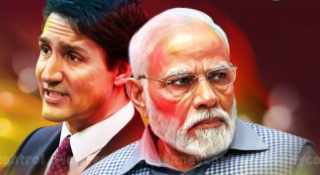Manas Dasgupta
NEW DELHI, Sept 22: The relations between India and Canada was strained further on Friday with the Canadian prime minister Justin Trudeau repeating his allegation against the Indian government despite New Delhi’s categorical denial of the charges.
Trudeau hanged on to his charge that “Indian government agents” were involved in the June killing of Hardeep Singh Nijjar, a Canadian citizen who was a wanted terrorist in India. He said there were “credible reasons to believe” so, but did not give any evidence. India has angrily rejected the allegation and flagged “politically condoned hate crimes and criminal violence” in Canada. The government said Canada had not shared any information regarding Nijjar’s killing.
Canada apparently going soft on the Khalistani extremists despite strained relations with India which could encourage the pro-Khalistan radicals in India’s Punjab and outside even as the movement finds little support in Punjab but the demand for a separate Khalistan keeps surfacing by minuscule sections of Sikh diaspora abroad, particularly Canada.
Observers fear that if Canada allows anti-India activities by radical pro-Khalistan elements in the name of freedom of expression, then it is but natural for these extremists to get emboldened, which is dangerous for Punjab that shares an International border with a hostile nation — Pakistan.
An angry India has sought the downsizing of Canada’s diplomatic presence in India. India also alleged “Canadian diplomatic interference” in its internal affairs and sought to reduce the number of Canadian diplomats working in the country. The foreign ministry said the Canadian diplomatic presence in India was larger than what India has and needs to be downsized.
The government has suspended visa services in Canada citing “security threats” that are not allowing their officials to carry out visa functions. “You are aware of the security threats being faced by our High Commissions and Consulates in Canada… this has disrupted their normal functioning,” the foreign ministry said.
The diplomatic row blew up Tuesday with both countries expelling senior diplomats and issuing travel advisories. India has asked its citizens living in Canada and those travelling there to exercise “utmost caution” in view of growing anti-India activities.
The two countries had tensions brewing after Prime Minister Narendra Modi scolded Trudeau at the Delhi G20 summit over Khalistan supporters attacking Indian diplomatic missions in Canada. Days later, Canada had postponed a trade mission to India, planned for October.
The India-Canada ties hit a new low after Trudeau linked “Indian agents” to the shooting of Nijjar outside a gurdwara in Surrey. Providing no evidence, he said his government had “credible allegations” of it. India rejected the charge as “absurd” but an obstinate Canadian prime minister repeated the charge.
The voices within the country remained united over the issue. Opposition Congress has backed the government and said the country’s interests and concerns must be kept paramount at all times. Parliamentarian Shashi Tharoor said there was no evidence of any government body linked to the terrorist’s killing.
Canada has been among the favoured hubs of expat Sikhs where extremism has mushroomed over the last few years. The past few months saw multiple Khalistani activities in Canada, including protests outside the Indian Embassy and threat posters for Indian diplomats.
Punjab went through a traumatic phase of militancy between the mid-1980s and early-1990s over the demand for Khalistan, a proposed ethno-religious sovereign land for the Sikhs, which saw the killing of tens of thousands of people.
While the Khalistan movement may have lost popular support in Punjab, security experts have been pointing out for a long time that there were people abroad and elsewhere in India who have an interest in keeping the embers of the long-dead movement alive. Over the past two years, there has been a rise in the spate of Khalistan-linked incidents in Punjab and neighbouring Himachal Pradesh. The grand rise of Amritpal Singh, the pro-Khalistan preacher, who was eventually arrested on charges under the National Security Act (NSA), had only created ripples across the State and beyond.
Soon after Canadian Prime Minister charged Indian government with hands in killing Nijjar, the pro-Khalistan leader in Canada, the Punjab-based radical outfits — Dal Khasla and Sikh Youth of Punjab — were quick to hit out at the government of India. Asserting that the “Khalistan movement was alive even today in India,” they appreciated the Canadian Prime Minister and sought a reply from Mr Modi on the accusation.
Simranjit Singh Mann, a known hardliner Sikh leader and representative of the Shiromani Akali Dal (Amritsar) from Punjab’s Sangrur parliamentary constituency, also took the opportunity to make his point. His party in a post on X (formerly Twitter), stated: “What Simranjit Singh Mann feared and raised in Indian Parliament has finally been confirmed today by Canadian PM Justin Trudeau in Parliament that Canadian intelligence believes that the Indian state was involved in the extrajudicial assassination of Hardeep Singh Nijjar…” Mr. Mann’s electoral victory in the year 2022 was already been seen by many as a message that the radicals were getting stronger in Punjab.
———————

